QuestionQUESTION: thanks for the response however i feel i have to clear things up. I'm still had feeding every 4-5 hours the kaytee exact formula for macaws and will continue to do so until he is ready to be weaned. he takes 20-22cc of formula at each feeding depending on the crop size. also i meant the baby food in the jars that is for first strained foods there is a one on the jar. Just wanted to clear a few things up so you didn't think i had no idea what i was doing. now i have one question that isn't related to my baby. I'm thinking about buying and hatching my own macaw eggs. I've checked the dealer and he seems legitimate. I have to sign a contract and in it it states that I must take the eggs to the vet and check to make sure they are healthy they are guaranteed to hatch and be fertile. Is there a way that the vets check these eggs to see if they are healthy? I'll be waiting for a response in the near future and thank you very much for helping me answer questions i just wish I knew about you before 2 needless trips to the vet to ease my mind. And to anyone out there who is thinking about asking questions please do they really know their stuff. Again thanks
Cindy
-------------------------------------------
The text above is a follow-up to ...
-----Question-----
I have a baby blue and gold macaw about 32 days old, he weights 10 1/8 oz or 290 grams I would like to know if this is just about where he should be. Do you have some kind of average weight gain chart or can you recommend a place where i can get one. Also when should he start getting his feathers he has pin feathers? I can see under the skin but they haven't emerged yet. What flavors of baby food do you recommend and is meat from stage one baby food ok? While I'm on the subject what is the ratio of baby food to formula that you would recommend? I got this baby at about 10 days old and he has gained weight steadily I was just curious as to how much he should be gaining. Thanks Cindy
-----Answer-----
Hi, Cindy. Thanks for posting!
"Normal" weight of a bird is subjective. It depends on overall body shape, size, etc. An average adult B&G should weigh 800 to 1292 grams. Therefore, I'd say your B&G at 32 days of age is just fine.
What is really important is that your bird is gaining weight and not losing weight, no matter what that weight is. In other words, as long as your B&G is gaining from his/her baseline weight, then the bird is most likely doing just fine. It's when baby parrots lose weight that indicates a problem. The exception to weight loss is when a bird is fledging...at fledging time, it's normal for a parrot to lose some weight. I've looked on the Internet and can't find a specific weight gain chart for B&Gs.
Pin feathers are the bird's feathers. Feathers will appear when the white keratin sheath around the feather shaft flakes off.
I feed my baby parrots all types of strained baby food...fruits, veggies, cereal, etc. The stage one meat is OK if your bird will eat it. However, your baby is too young yet to be eating solid food. You should still be handfeeding with baby macaw handfeeding formula.
You want more formula than baby food. I don't have an actual "ratio" and I don't measure...I just put some baby food in with the formula and stir it up (perhaps 1/2-1 teaspoon, depending on how much formula your baby is eating per feeding).
Here's some good info on B&Gs:
http://www.parrotpro.com/macped.htm
Chrys
ANSWER: Hi again, Cindy.
I would not trust anyone selling parrot eggs. You can verify this with a certified avian veterinarian, but there is no way for an avian vet to know whether an embryo in an egg is healthy or not. In fact, I don't know how a person can guarantee fertility and hatchability. There are too many things that can go wrong from the point when an egg is laid to when it hatches. In addition, if eggs aren't kept at a constant required temperature and humidity level for the required number of days, an embryo isn't going to live. The mere effort of taking eggs from point A to your home would, in my mind, jeopardize the viability of any eggs. I would not do business with this person in any way, shape, or form. Do you have experience manually incubating eggs and handfeeding just-hatched chicks? Neither easy tasks to begin with.
We're not avian vets here, so don't think you don't have a need for a good certified avian veterinarian. We have a lot of knowledge and experience to share, but a good bird vet is invaluable.
Chrys
---------- FOLLOW-UP ----------
QUESTION: On my blue and gold macaw he is 45 days old and is eating about 35 cc of kaytee exact hand feeding formula for macaws with added strained baby food fruits,vegetables and cereals I feed him 4 times a day about 5 hours between feeding. The question is he still seems starved when he is done eating but his crop is rounded and firm and I stop feeding him, should I continue to feed him more until he stops eating or continue to do as I've been doing? When you hold him he starts pumping on anything he can get hold too and really seems annoyed. He is steadily gaining weight and is up to one pound. He gets weighted every morning before the first feeding. I've had different opinions on what to do and I just wanted your input. Thanks Cindy
AnswerHi again, Cindy.
How are you mixing the formula? If you are mixing it too thin, he may not be getting enough nutrition from the food and, therefore, even though filled up, he's not getting the nutrition he needs. However, if he's gaining weight, he's getting more calories then he's using. 35cc's seems about right for a macaw weighing a pound. When you handfeed, a proper amount to fill the crop would be just before you can see any food in the bird's neck. In other words, if you can see food backing up in the bird's neck, you've fed too much. You should stop feeding when formula reaches the top of the crop (you should be able to see the formula in the crop through the skin). You don't want to stretch the crop too far either by overfeeding (the baby will regurgitate if you feed too much...the formula will start coming back out of the mouth). You may want to try feeding the same amount more often and see if this stops the begging if you suspect he might be undernourished. However, it sounds like he's right on track.
Realize that as long as the baby can see, hear, or smell you, or if you touch him, he will continue to beg. You represent food to this bird right now and that's mainly what he is interested in, so he's going to act like a pig and try to get all he can. It takes time for the formula to digest once in the crop, so the bird doesn't really know he's been fed yet, except that being fed warm food usually makes them go to sleep! He will continue to pump if he thinks he can get more food from whatever. You may prefer to do what I do and leave him alone to go to sleep right after being fed (at least until he gets old enough to stay awake and play after eating). The pumping (feeding response) is just an instinctive action (it closes the trachea off so food doesn't go into the lungs) when a bird thinks it's going to be fed.
I use Kaytee Exact and I've enjoyed many, many years of nice, healthy baby parrots as a result.
Be assured that the begging is normal! I know that it makes you feel bad or guilty for some reason (does me every time), but your baby isn't going to starve and I'm sure he doesn't go hungry!
Chrys

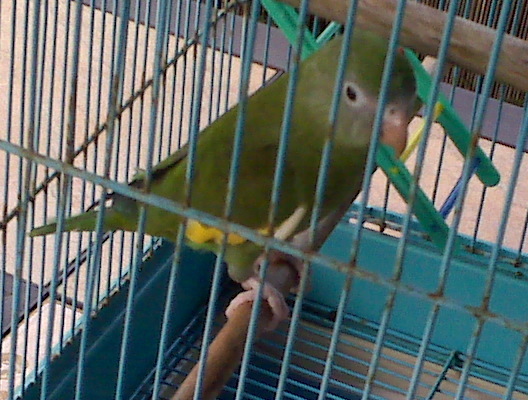 What type of parrot is this?
Question
Friendly bird
A week ago ths small parrot flew
What type of parrot is this?
Question
Friendly bird
A week ago ths small parrot flew
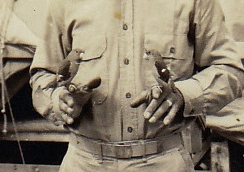 ID Birds
Question
Panama Birds
My uncle served in Panama in 1941
ID Birds
Question
Panama Birds
My uncle served in Panama in 1941
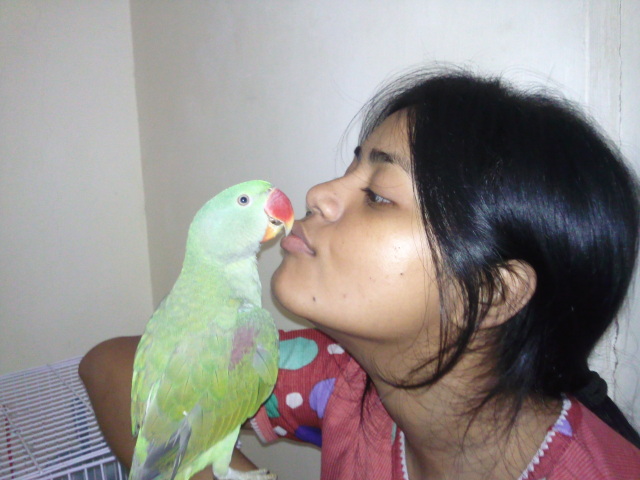 can i give my parrot chole(chana) called in hindi
Question
my little chaddi alexa
dear sir,
can give chan
can i give my parrot chole(chana) called in hindi
Question
my little chaddi alexa
dear sir,
can give chan
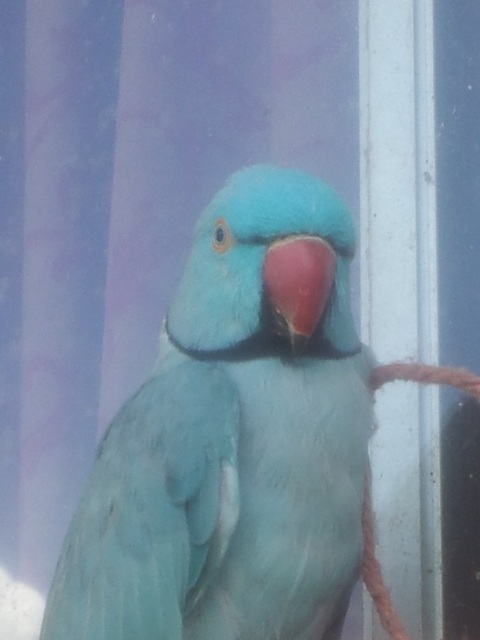 RE: Indian Ringneck probems
Question
Indy our Ringneck
Thank you for your he
RE: Indian Ringneck probems
Question
Indy our Ringneck
Thank you for your he
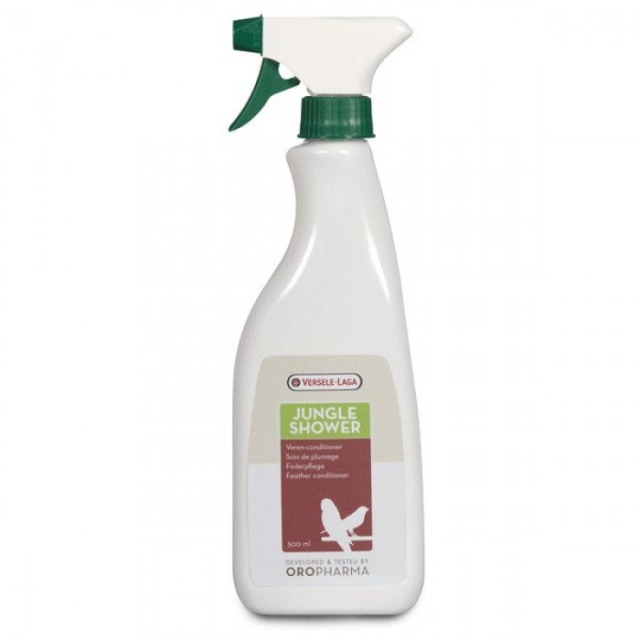 Indian Ringneck Health Issue
QuestionI have an Indian Ringneck who had been neglecte
Indian Ringneck Health Issue
QuestionI have an Indian Ringneck who had been neglecte